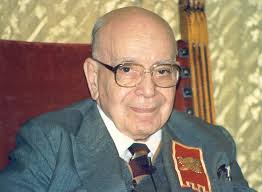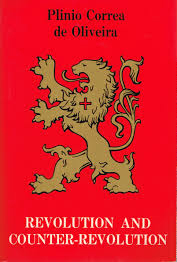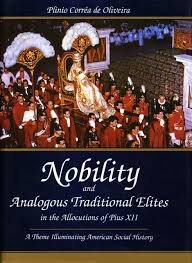“Each one of us has a cross to carry. Each one of us would like to be something he is not, to have something he has not, to be able to accomplish something he cannot. We need to let go of being what we are not, having what we have not, and accomplishing what we cannot; this is the way for all of us.” – Plínio Corrêa de Oliveira (1908-1995), in ‘Reflections on the Passion of Our Lord Jesus Christ’ (https://www.tfp.org/lenten-reflections/)
In touch with the Society for the Defence of Tradition, Family and Property (TFP) for a decade (1989-1999), its Founder’s spirituality came easily to mind in my quest for Lenten reading. Here are a few notes on the man whose life can’t fail to touch a committed Christian:

Plínio Corrêa de Oliveira was a Brazilian intellectual and Catholic activist. At 24 he became the youngest congressman in Brazil’s history and a leader of the Catholic bloc. Valuing his Catholic faith above all else, he turned his back on a political career and served the Church. He taught Modern and Contemporary History at the Pontifical Catholic University of São Paulo and was editor of the Catholic weekly Legionário. In 1951, he founded the magazine O Catolicismo and later was a columnist for Folha de S. Paulo, the city’s largest daily.
Dr Plínio (as he was fondly known) was an avowed Thomist, his political ideology anti-Communist. To counter the school of liberation theology and the Cuban revolution, he founded the TFP in 1960. He decried the reforms of the Second Vatican Council but remained devoted to the Chair of St Peter.

Dr Plínio is the celebrated author of fifteen books and over 2,500 essays and articles. Some of his works are: In Defence of Catholic Action (1943); Revolution and Counter-Revolution (1959), a seminal treatise that inspired the founding of autonomous TFP groups in several countries worldwide; The Church and the Communist State: The Impossible Coexistence; and Nobility and Analogous Traditional Elites in the Allocutions of Pius XII, his swan-song.

Dr Plínio’s writings have the mark of an intense interior life. He had deep confidence in the Blessed Virgin Mary. An unparalleled twentieth-century crusader for a Christian Civilization, and the final victory of good over evil, he believed in the words of Our Lady at Fatima: “Finally my Immaculate Heart will triumph!”
After Dr Plínio’s death, there was a split in the TFP. Eight co-founders took charge of the organization while a large chunk led by Mgr. João Clá Scognamiglio Dias left to set up Heralds of the Gospel. The new group, open to the reforms of the Second Vatican Council, was recognized as an International Association of Pontifical Right, the first one established by the Holy See in the third millennium. They are now present in 78 countries.
Mgr. Dias eventually got back control of the TPF, now devoid of its former glory. Meanwhile, the original co-founders of the TFP set up Instituto Plínio Corrêa de Oliveira (IPCO) to carry on the Founder’s ideology and activity. IPCO is associated with the TFPs and similar organizations worldwide, like the TFP was before their division.
In 1989, the TFP paid tribute to their Founder in a book titled O Homem, Uma Obra, Uma Gesta. Dr Plínio has many other biographies, two main ones being The Crusader of the Twentieth Century, by Roberto de Mattei (1998) and Rencontre avec Plínio Corrêa de Oliveira – Défenseur de la Chrétienté, by Mathias Von Gersdorff (2019). Earlier, regretting the absence of an autobiography, IPCO published Minha Vida Pública (2015), an anthology of writings that throw light on the life and mission of the man.
Knowing Dr Plínio Corrêa de Oliveira’s ideals fills a Christian with hope. His profound analysis of history and world events and his supernatural approach to life – a loving acceptance of the Cross – can uplift the most disheartened soul. To me, a decade with Dr Plínio was worth a lifetime.
Heralds of the Gospel, https://www.arautos.org/
IPCO, https://www.pliniocorreadeoliveira.info/biografia.asp)
Dr. Plinio Corrêa de Oliveira was a Catholic man of faith,hope and action. He dedicated his life in defence of the Catholic Church.
His book Revolution and Counter-Revolution is a masterpiece in which he analysed the Revolution’s historical process that started in the Middle Ages
Being part of the TFP, I had the privilege to meet Dr. Plinio in 1990 and again in 1992. He has been a great inspiration to me. His intellectual work in defence of the Catholic Church is exceptional.
As mentioned by Mr. Oscar subsequent to the death of Dr. Plinio there was a split in the TFP. Msgr. João Cla made concession to the Revolution and embraced the Vatican Council which he himself opposed fiercely in the past.